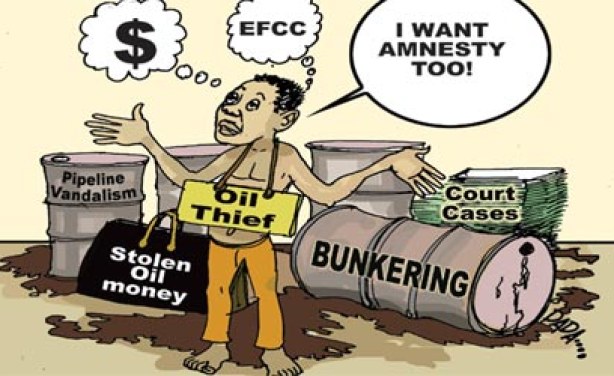Four long months after taking office Nigerian President Muhammadu Buhari finally announced his cabinet positions, with the most controversial and lucrative – oil – going to himself.
Whether Buhari, himself a former oil minister, can clean up an industry that two years had $20 billion in missing funds is quite unclear. Critics say the new president is over-reaching with what amounts to a full-time second job.
Grace Obike writes: Oil provides 70 percent of Nigeria’s government revenue but is an industry plagued with malfeasance. Two years ago the central bank reported $20 billion in missing oil-related funds.
As Africa’s biggest oil producer, crude runs through the arteries of the Nigerian economy.
But mismanagement and the theft of billions have also plagued the ministry for decades. Most oil is stolen through accounting and oversight gaps. But much goes missing far away from the minister’s eyes: from oil fields, pipelines, and even from the export terminals.
Buhari said last week he is taking the oil ministry job because he doesn’t trust anyone else. His plans include stepped-up accounting of oil receipts and recovering of stolen funds..
Much of the malfeasance appears to have taken place under Diezani Alison-Madueke, the oil minister under former president Goodluck Jonathan, Buhari’s predecessor. Ms. Alison-Madueke was arrested Oct. 2 in London on charges of bribery and money laundering. Her five-year reign at the ministry is widely seen as a period of rampant corruption and theft.
Alison-Madueke’s arrest underscores the complexities in the petroleum sector. But while it could open a path for Buhari to address corruption in an industry he served as government minister for in the 1970s, some question if Buhari’s effort to take charge of oil is constitutional and whether he is the right person for the job.
Buhari’s biggest obstacle may be reining in the NNPC. The huge state oil firm is Nigeria’s largest employer. It’a also the according the least transparent oil company in the world, according to Transparency International and Revenue Watch.
The NNPC has diverted more than $30 billion in oil revenue from the state since 2009, according to a Nigerian watchdog agency. A 2013 PricewaterhouseCooper audit stated that the oil behemoth had a “blank check” to spend without oversight.
Buhari knows the company intimately. He oversaw its creation in the 1970s while he was oil minister. It is this expertise that many say could help him clean up the organization.
Local investigations into Alison-Madueke’s conduct as oil minister, for example, have yielded little result. After she left office, the new government said that between 2012 and 2015, some $19 billion in oil revenue is unaccounted for.
Moving forward, a critical question is whether the arrest of the former oil minister is the beginning – or the end – of Buhari’s NNPC probe.

